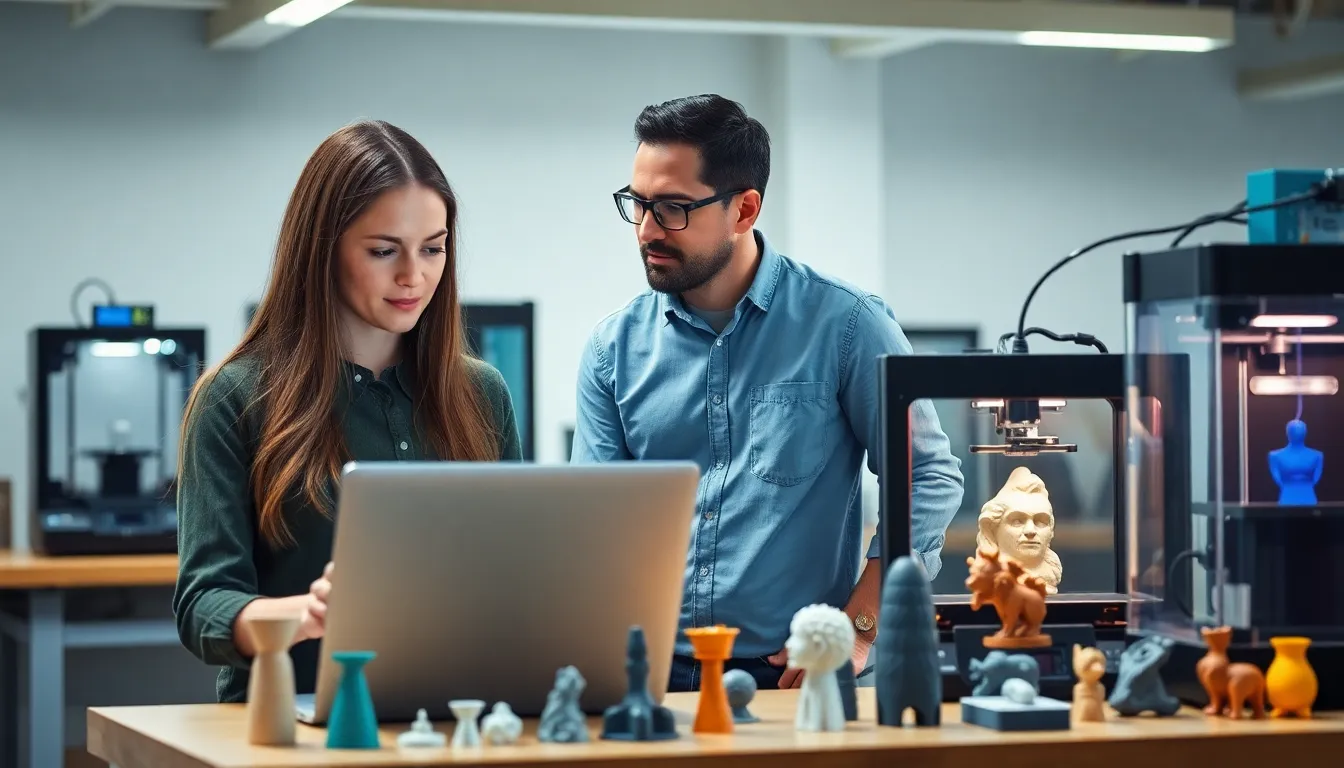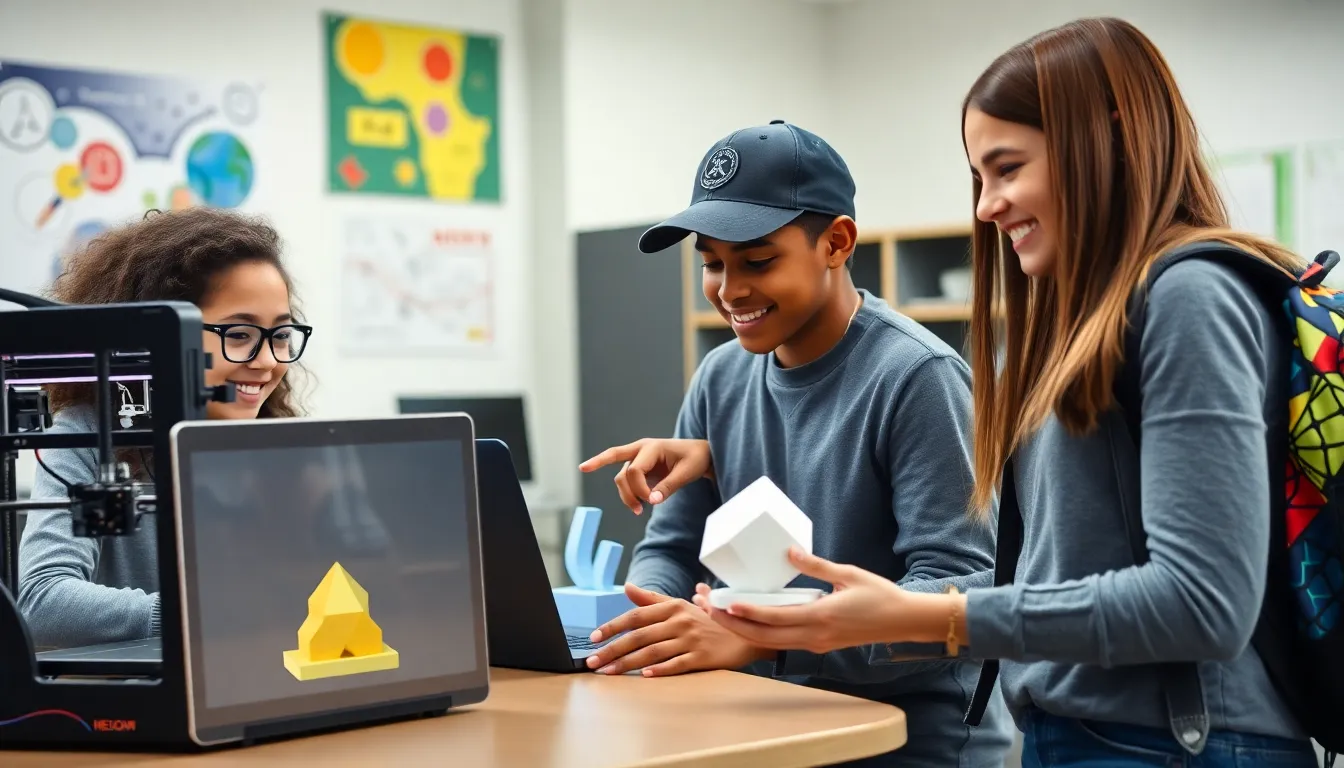In a world where everything from toys to prosthetics can be whipped up in a printer, 3D printing jobs are hotter than a fresh batch of cookies. If you’ve ever dreamed of turning your creative ideas into tangible realities, now’s the time to dive into this exciting field. With local opportunities popping up like mushrooms after a rain, finding a 3D printing job near you could be the best decision since someone decided to put pineapple on pizza—controversial but oh-so-rewarding!
Whether you’re a tech whiz or an artistic soul, the 3D printing industry offers roles that cater to every skill set. From design to production, these jobs not only pay the bills but also let you flex those creative muscles. So why not explore what’s available nearby? You might just discover that your next career move is waiting for you in the magical world of 3D printing.
Table of Contents
ToggleUnderstanding 3D Printing Jobs
3D printing jobs encompass various roles that require diverse skills. These positions range from graphic designers to engineers, each contributing to the production of innovative items. Career paths may include roles like additive manufacturing technicians and project managers. Each position plays a crucial part in the execution of a project from concept to creation.
Individuals interested in technical opportunities often focus on engineering. They work on creating and optimizing printing processes. Artistic talent also holds value, especially for designers who conceptualize products. A blend of creativity and technical ability opens numerous avenues within the industry.
Businesses in sectors such as healthcare, aerospace, and automotive actively seek skilled professionals. Companies utilize 3D printing for prototyping and manufacturing parts efficiently. Job seekers should research local markets to identify specific needs within their community. Exploring companies that offer 3D printing services can yield potential employment opportunities.
Networking within the industry proves advantageous. Attending local events or meetups fosters connections with key players in 3D printing. Online platforms and professional groups also serve as resources for job postings and industry insights. Staying informed about advancements and technologies in 3D printing enhances an individual’s marketability.
Interest in sustainability boosts the demand for eco-friendly 3D printing solutions. Many companies prioritize efficient materials and processes in their production methods. Job seekers focusing on sustainable practices can find niche opportunities. Engaging with educational programs further develops necessary skills, providing a competitive edge in the job market.
Types of 3D Printing Jobs

Various roles exist within the 3D printing industry, each contributing uniquely to the overall process.
Design and Modeling
Designers create 3D models and prototypes, using software like AutoCAD and Blender. These professionals focus on translating ideas into digital formats. They work closely with clients to understand their vision, ensuring functionality and aesthetics. Experience in CAD software is crucial, as it allows designers to craft precise models for production. Collaboration with engineers also plays a key role, ensuring designs are practical and manufacturable. Strong problem-solving skills provide an advantage, enabling designers to address challenges efficiently.
Production and Operation
Production roles involve operating 3D printers and managing manufacturing processes. Technicians monitor machine performance, perform maintenance, and troubleshoot issues. Operators also ensure adherence to safety and quality standards while managing inventory for materials. Experience with different 3D printing technologies, like FDM and SLA, proves beneficial in these positions. Additionally, individuals in this field must understand production timelines and workflow management. Working efficiently under pressure is essential, as deadlines often dictate the pace of operations.
Quality Control
Quality control specialists ensure that printed products meet established standards. They conduct inspections and tests on printed items, identifying defects or inconsistencies. Familiarity with quality assurance processes and measurement tools allows these specialists to maintain high accuracy. Attention to detail plays a vital role in this job, as precision impacts functionality. Clear communication with production teams helps address quality issues swiftly. Professionals in quality control ultimately contribute to customer satisfaction by ensuring products meet specifications.
Finding 3D Printing Jobs Near Me
Exploring 3D printing job opportunities requires a strategic approach. Utilizing specific resources increases the chances of finding suitable positions.
Online Job Boards
Online job boards serve as valuable tools for discovering 3D printing opportunities in the local market. Sites like Indeed, LinkedIn, and Glassdoor offer extensive listings of relevant job openings. Job seekers should refine search filters to target specific roles such as engineers, designers, or production technicians. Setting up job alerts ensures timely updates on new listings within the desired geographic area. Many companies post positions exclusively on these platforms, providing a competitive edge. By actively checking multiple boards, candidates can uncover unique opportunities that might not appear elsewhere.
Local Networking Events
Local networking events provide excellent chances to connect with industry professionals in the 3D printing field. Attending meetups, workshops, and conferences fosters valuable relationships. Many events feature guest speakers and panel discussions, allowing attendees to gain insights into industry trends. Engaging in these gatherings facilitates conversations around potential job openings and collaborations. Professionals often share leads on available positions or internships. Building a local network enhances visibility and makes job seekers more attractive to employers within the community.
Skills Required for 3D Printing Jobs
3D printing jobs require a unique mix of technical and soft skills. These skills are essential for effectively navigating the challenges and opportunities within the industry.
Technical Skills
Proficiency in 3D modeling software is crucial for success in this field. Designers often work with programs such as AutoCAD or Blender to create accurate models. Understanding various printing technologies, including FDM and SLA, enables professionals to select the right method for particular projects. Familiarity with engineering principles aids in ensuring designs are both functional and manufacturable. Calibration and maintenance of 3D printers contribute to the efficiency and quality of production processes. Knowledge of materials like PLA, ABS, and resin allows for informed decisions that impact product durability and aesthetic.
Soft Skills
Strong communication skills enhance collaboration between designers, engineers, and clients. Creativity drives innovation, prompting individuals to develop unique solutions and push boundaries. Attention to detail ensures high-quality outcomes, particularly during the modeling and production phases. Time management contributes to meeting deadlines and balancing multiple projects simultaneously. Adaptability fosters growth in a rapidly changing technology landscape, allowing professionals to embrace new techniques and tools appropriately. Teamwork skills support the collaborative nature of 3D printing, with successful projects emerging from diverse perspectives and expertise.
The 3D printing industry offers a wealth of opportunities for those ready to dive in. With diverse roles and a growing emphasis on sustainability there’s never been a better time to explore local job options. By honing essential skills and leveraging networking opportunities job seekers can position themselves for success in this innovative field.
As businesses across various sectors continue to adopt 3D printing technology the demand for skilled professionals will only increase. Embracing this trend can lead to a fulfilling career that combines creativity with cutting-edge technology.






